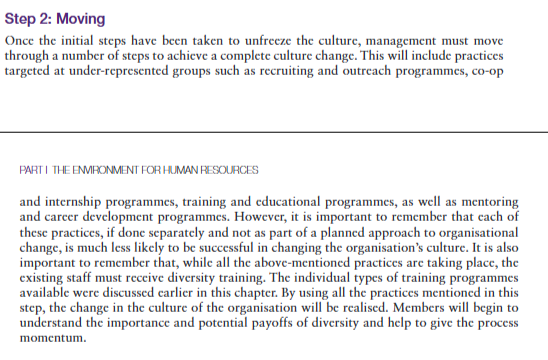Industrial Psychology: Chapter 3
1/10
There's no tags or description
Looks like no tags are added yet.
Name | Mastery | Learn | Test | Matching | Spaced | Call with Kai |
|---|
No study sessions yet.
11 Terms
Managing Diversity
the process of acknowledging, valuing, and actively supporting differences among people in an organisation.
Lewin & Shein - a model for managing diversity
1.) Freezing: Changing the existing culture.
Starts with diverse leadership (e.g., diverse top teams & boards).
Top management must:
Create & communicate a clear vision for diversity.
Allocate resources and support.
Form a diversity steering committee to guide efforts.
2.) Moving: Implementing actions to change organisational culture. Recruiting under-represented groups, outreach, co-op & internship programmes, training, mentoring, and career development.
3.) Refreezing: Make diversity changes permanent by institutionalising them.
Align policies, procedures, and rewards with the new culture.
Ensure systems support—not conflict with—diversity (e.g., inclusive language).
Tie appraisals and compensation to diversity goals.
Prevents reverting to old habits and solidifies a multicultural organisation.
4.) Competitive Advantage: Improved creativity & decision making, More agile & adaptive workforce, Broader demographic market, Increased market share

Affirmative Action or Employment Equity
•Government pressure
•Legislation
•Quantitative
•Representivity of the workforce
•Assimilation
Valuing diversity
Employment equity: Legal approach to remove workplace discrimination.
Affirmative action: Corrective action to advance disadvantaged groups.
Valuing diversity: Goes beyond compliance—focuses on inclusion, respect for differences, and leveraging diversity for organisational success.
Shifts from numbers → culture; from legal change → genuine inclusion.
Response to Diversity: Government Legislation
•The Constitution of the Republic of South Africa (No.108 of 1996)
•Employment Equity Act (EEA) (No. 55 of 1998) (as amended)
•Labour Relations Act (LRA) (No. 66 of 1995)
•Basic Conditions of Employment Act (BCEA) (No. 75 of 1997) (as amended)
•Broad-Based Black Economic Empowerment (B-BBEE) (No. 53 of 2003)
Sexual Harassment
Any unwanted conduct of a sexual nature that is intended to affect or interfere with a person's work performance or meant to create an intimidating, hostile, or offensive work environment
Different types of sexual harassment
•Quid pro quo sexual harassment
•Hostile environment harassment
Sexual Harassment: HR's responsibility
Identifying/recognising the characteristics of sexual harassers
Drawing up a good sexual harassment prevention policy
Providing effective sexual harassment training
Ways of measuring and researching sexual harassment
Grievance data, oral complaints to managers or HR, Exit interviews, survey data
South Africa’s Diverse Population
•Population groups
•Women
•The age of the workforce
•South Africans with disabilities
•Sexual/affectional orientation
•HIV and AIDS
•Religion
Diversity
Any collective mixture characterised by its differences, similarities and related tensions and complexities